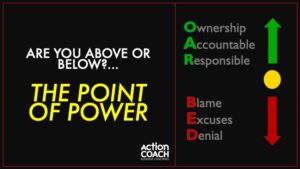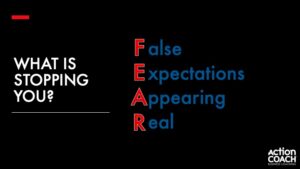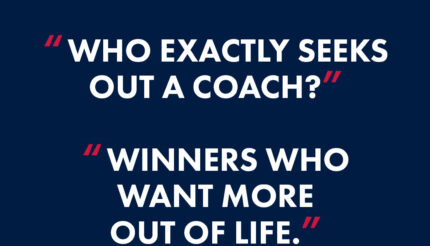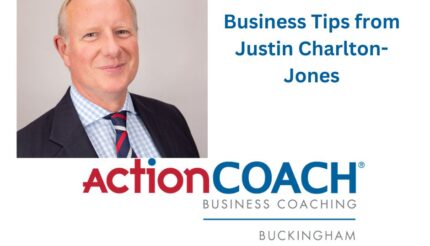Conquering Fear
Everyone has experienced fear in their lives at some point.
The intensity of the emotion, the feelings of that fear can vary from moments of mild anxiety to absolutely paralyzing moments of pain!
When it comes to business, fear can get in the way of progress and inhibit us achieving our goals.
We have all avoided something we did not want to do. Sometimes we make up excuses for not doing it, yes? On occasion the fear is so powerful, that it stops you in your tracks – it’s causes procrastination, wastes time and becomes the ultimate excuse. Such inaction breeds further doubt and fear and so the vicious circle takes over… Let’s put a stop to that.
You are in control of your own thoughts
I’ll say it again, fear can get in the way of progress – but only if we let it.
You can’t control everything, yet you can control what you THINK.
“Whether you think you can, or think you can’t, you’re right” Henry Ford
Deny your thoughts and you are unlikely to get the positive outcome you after, confront your fears and you can find a way. Where there is a will there is a way, I believe the old saying goes.
Denial or excuses may offer a short-term reprieve from the fear, but who are you kidding?
Objectively focusing on the issue at hand is key.

False Expectations Appearing Real
When helping clients conquer fears, at ActionCOACH West Herts we often draw on the phrase; False Expectations Appearing Real. Let me explain.
Leave our imaginations to their own devices and they can run a mock, conjuring up all kinds of emotions related to experiences from our past, not necessarily in a rational or logical way. These feelings appear so quickly, our rational brains often can’t keep up! The feelings are real, yet the foundations of which they are built are often in our imagination not reality. Our imagination is a very powerful thing so of course it feels very real – we are built this way, for speed efficiency and survival. Its quicker for our minds to look at patterns and judge a situation to trigger us into action than slowly and rationally review all the facts.
See threat and our auto-pilot brain says flight or fight – not objectively evaluate all of the options and decide on the best cause of action!

10 Tips to help overcome/manage fear:
Ok we are all human and we can’t eliminate fear, but we can manage it – so we are in control of it, not the other way around.
- Firstly, acknowledge the unhealthy thoughts causing you fear. Secondly create space and take a time out (the breath moment) to review the thoughts in your head. Then examine the evidence (see point 2) before deciding what is worth listening to and what you can let go of.
- Take an objective and balanced approach to review the FACTS. Look at the evidence, ask yourself is this true? Where is the evidence? And or provide your own alternative evidence, based on positive past experience. Writing things down to get them out of a jumbled head can be helpful here.
- Replace the phrase ‘what if’ with ‘what then’. Two little words can be very powerful. When it comes to fear asking ‘What if’ often generates a list of negative things that might go wrong and if not objectively evaluated simply can compound your fear. So instead ask ‘What then’, which tends to force the brain into thinking about positive solutions, responses on workarounds.
- Don’t be so hard on yourself – If you are your own worst critic, you might just need to learn the phrase ‘so what’!
- Share – ‘A problem shared is a problem halved’ – I don’t think that requires any further explanation. Its worth noting that if your fear reaches a more extreme/debilitating level, objectively reviewing facts can be very difficult alone. This is when speaking to someone else is key as they can help you see sense from a calm perspective (they are not experiencing your emotions). A role of a coach sometimes, but a partner, colleague anyone you trust can help. Don’t suffer in silence.
- There is no ‘failure’ just leaning. A perfectionist for example may avoid pursuing an opportunity if he/she isn’t sure he will excel at it…whether developing a new skill, going after a big client or starting a conversation with a stranger. Perfectionists lose out on learning and growing from mistakes. I prefer the phrase continuous improvement – with this in mind start with a realistic expectation that mistakes might well be made, leanings will be had and the more we do the more we will learn.
- Take a leap of faith – People often talk themselves out of what they want because they are unsure the outcome. We are born with this ability – remember learning to walk!
- If your fear the outcome of an important decision you need to make – focus not just on the outcomes of the decision, but also the actions that ensure the outcome you desire. e.g. We will succeed if all comes together as planned. So, you could say to ensure success we need to check we’ve the right plan and do everything in our power to ensure all goes to plan. Objectively you could also ask yourself what is the worst that could happen and again review actions you could take to ensure it does not.
- Have a contingency – It’s possible that your “fear” is real. If this is the case start working on a contingency urgently, because if you know it to be real it could well become a reality unless you take action. What you fear here is the negative outcome of not doing anything or changing the way you do things. You could be in denial and trying to ignore the reality of the situation. Taking ownership, responsibility and action is your only real choice here.
- You can only control what you can control! – Focus on what you can do, not what you can’t!
It’s natural to feel fear, so don’t ignore it – harness it as a force for positive action and change. Interested in more tips of combatting fear? Book an introductory call with one of our coaches.
James Gentle – Partner & Business Coach – Find me on LinkedIn






Comments
Comments are closed.